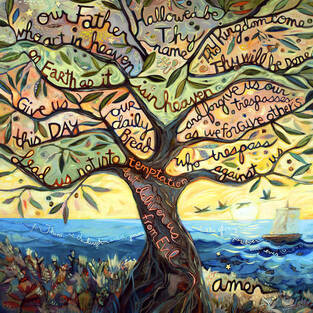
Luke 11: 1-13; Genesis 18:20-32
Based on a sermon by Scott Hozee: https://cepreaching.org/commentary/2016-07-17/luke-111-13/
As we cruise through our summer season, renewing our bodies and spirits through rest and warm weather, we continue our reflection on spiritual renewal of our church body our individual spirits through biblical concepts like being a good neighbor, through the practice of holy hospitality and sacred listening. Today we add the linchpin of prayer. What it means to pray like Jesus. To pray with shameless persistence, as the gospel tells us.
The Lord’s Prayer is hands down one of the most famous prayers ever. It is recited millions of times a day, in hundreds of different languages. For a prayer of such importance, it has ordinary, humble roots. Luke very casually says that when Jesus uttered this model prayer, it happened “one day” “in a certain place.” One disciple, who’s name we do not know, saw Jesus praying, and said, “teach us to pray, like John taught his disciples.” Spiritual teachers like John or Jesus had unique habits that set them apart from other groups. So, the Lord’s prayer sets us apart as Christ followers. It is a map to the values to a life rooted in Jesus.
Luke records nine prayers of Jesus, more than the other gospels. Jesus prayed ceaselessly, to use Paul’s teaching in 1 Thessalonians 5:17. Moreover, according to our gospel passage, we are to pray with shameless persistence. To prayer boldly for our needs. Prayer for Jesus was like breathing, it was woven into his very being, and formed the foundation from which all he did flowed. Ceaseless prayer, shameless persistence prayer, is a hallmark of a vital spirit, a vital congregation. So how does the Lord’s prayer transform us? The prayer we call the Lord’s prayer is really the disciples’ prayer, it is a guide we should follow.
We can divide the disciple’s prayer into two parts; the first part of the prayer reveals our relationship with God, and the second part describes the foundation of faith we need to lift up on a day-to-day basis. The disciple’s prayer reminds us: our relationship with God is intimate: We come to God with the utmost confidence that we would approve a loving father. Note it is not my dad, not your dad, but our dad. The disciple’s prayer is communal, it includes all people. While each one of us prays alone or privately throughout the day, prayer is more than a solitary act. We are also called to pray together and pray for each other. We connect to a God whose name is Holy, adored, worshipped, exalted. And before this Holy and precious Father, we claim the realm of God, God’s kingdom, and God’s will, as our most ardent desire. All prayer flows from this foundation. So, our primary orientation in prayer and the life of faith, a vital life, is to lift up God and his purpose for our lives. There is no finer prayer than to say, “thy will be done,” Isn’t that what Jesus prayed in the garden of Gethsemane?
The second half of the disciple’s prayer establishing three interesting spiritual needs. We pray for our daily bread (actually for all the sustenance we need, perhaps strength of character, the resources to live out and nourish our day). Second, every day we need forgiveness and to forgive. That is a major teaching of Jesus. To remember we are fallible, we make mistakes, and we need to own up to them. Because by the measure we judge, Jesus reminds us, so we are judged. Third, we pray to be delivered from evil, because the truth is that the Evil one is always, constantly looking to pull us down, as God is always striving to pick up us. Peter reminds us that the adversary, the devil, is like a roaring lion, seeking to devour us (1 Peter 5:8). The disciple’s prayer begins connecting us to God’s love and will for our lives, roots us in the present, while the pray ends reminding of the reality of evil that tries to subvert us away from the daily resources that we need, to keep us from forgiving and being forgiven, and to ignore the evil in the world, evil that seeks to supplant God’s will.
While the content of the disciple’s prayer is important for us to meditate on and live out, Jesus stresses the shameless persistence of prayer as vital as well. Prayer should be ceaseless, imbedded in every thought and deed we do. The two brief parables examples that Jesus includes teaches us about the persistence in prayer. “The “Friend at Midnight” story reminds us that prayer pops up all the time and does not wait for convenient seasons or moments. The word “impudence” here is better translated as “shameless persistence.” If someone gives bread at midnight as the annoying persistence of a friend, how much more will God supply our needs?
“What about the father-son (parent child) analogy with which Jesus shares? As any parent can tell you, a son or daughter who asks for a fish or an egg is unlikely to make such a request just once. If anything kids are doggedly persistent. “Are we there yet?” “Can I watch TV now?” and so forth. “There are those times when, after being asked by your daughter for the fifteenth time in a row if she can have just one more cookie—and after your having said “no” to this request fourteen times in a row—sometimes even good, conscientious parents will finally throw the cookie at the hapless kid. “There! Eat it! You happy now?!” Our patience can wear thin.” For the cat lovers among us, who hasn’t dealt with a feline who walks on our face, meowing insistently at 5:00 am for breakfast? Shameless persistence! So like our child, we too are to practice ceaseless prayer, shameless persistence.” If we fallible human beings end up doing right by our badgering children, how much more attentive with God be? God welcomes our onslaught of prayer. Because God answers prayer in God’s time and in God’s way, not our time, or perhaps not the way we want it to be answered; we need to maintain courage, shameless persistence, hope in all we ask, in all we seek and every time we knock.
Look at the conversation between Abraham and God about the fate of Sodom and Gomorrah. Abraham repeatedly goes after God to spare Sodom and Gomorrah. This illustration is a blueprint for prayer. We talk with God like Abraham does, perhaps more irreverently, when we are praying. It’s what God wants from us. To bring to him all our joys, concerns, troubles, thoughts and cares, over and over again.
Praying like Jesus, we become one with him and each other, and we awaken the Holy Spirit to bring us new life. That’s the purpose of prayer; not to change God, but to change us, so we pray above all things that God’s will be done, with shameless persistence and ceaseless effort. Such is the hallmark of a vital life, a vital congregation – to pray shamelessly, ceaselessly, boldly for our needs, hopes and for Holy Spirit power, trusting that it is our loving Father’s deepest desire is to grant us what we need, to protect us from evil, and in doing so, to bring about the kingdom of heaven in our lives as it is in heaven.
https://biblicalstudies.org.uk/pdf/scripture/52_115.pdf



 RSS Feed
RSS Feed